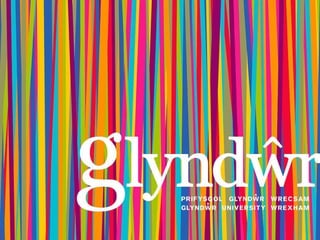Postgraduate Certificate E-learning
•Télécharger en tant que PPT, PDF•
0 j'aime•374 vues
Presented at the JISC-RSC ‘Learning in a Digital Wales – Dysgu mewn Cymru Digidol’ conference, June 30th 2010
Signaler
Partager
Signaler
Partager

Recommandé
Waking up webinars: bringing active learning online - Lemke

Waking up webinars: bringing active learning online - LemkeIL Group (CILIP Information Literacy Group)
Contenu connexe
Tendances
Waking up webinars: bringing active learning online - Lemke

Waking up webinars: bringing active learning online - LemkeIL Group (CILIP Information Literacy Group)
Tendances (20)
using digital media technologies for creative Teaching and Learning

using digital media technologies for creative Teaching and Learning
Learning in the Open: Faculty and Student Perspectives of blogging to Support...

Learning in the Open: Faculty and Student Perspectives of blogging to Support...
Waking up webinars: bringing active learning online - Lemke

Waking up webinars: bringing active learning online - Lemke
CI Online Teaching Preparation Program: Annual Review 

CI Online Teaching Preparation Program: Annual Review
A Blended Online Approach for Faculty Development in Online Teaching

A Blended Online Approach for Faculty Development in Online Teaching
Similaire à Postgraduate Certificate E-learning
Similaire à Postgraduate Certificate E-learning (20)
Preparing Instructors to Teach Online: Two Faculty Development Models

Preparing Instructors to Teach Online: Two Faculty Development Models
Flipped Classrooms: A Powerful Teaching Tool, But Not a Panacea

Flipped Classrooms: A Powerful Teaching Tool, But Not a Panacea
the craft of e-teaching; moving from digitally shy to digitally confident wit...

the craft of e-teaching; moving from digitally shy to digitally confident wit...
Social learning in the Diploma of e-learning - TNQIT

Social learning in the Diploma of e-learning - TNQIT
CIT2017 - Virtual Reality & Student-Created Video for Learning

CIT2017 - Virtual Reality & Student-Created Video for Learning
I-HE2020 The European Maturity Model for Blended Education

I-HE2020 The European Maturity Model for Blended Education
Elena Xeni - An Instructor’s Reflections on Piloting and Evaluating a TEL Ac...

Elena Xeni - An Instructor’s Reflections on Piloting and Evaluating a TEL Ac...
Digitally enhanced learning in the covid 19 era for steam ed dec 20

Digitally enhanced learning in the covid 19 era for steam ed dec 20
Plus de Clive Buckley
Plus de Clive Buckley (9)
Dernier
APM Welcome, APM North West Network Conference, Synergies Across Sectors

APM Welcome, APM North West Network Conference, Synergies Across SectorsAssociation for Project Management
Dernier (20)
TataKelola dan KamSiber Kecerdasan Buatan v022.pdf

TataKelola dan KamSiber Kecerdasan Buatan v022.pdf
A Critique of the Proposed National Education Policy Reform

A Critique of the Proposed National Education Policy Reform
Presentation by Andreas Schleicher Tackling the School Absenteeism Crisis 30 ...

Presentation by Andreas Schleicher Tackling the School Absenteeism Crisis 30 ...
APM Welcome, APM North West Network Conference, Synergies Across Sectors

APM Welcome, APM North West Network Conference, Synergies Across Sectors
Science 7 - LAND and SEA BREEZE and its Characteristics

Science 7 - LAND and SEA BREEZE and its Characteristics
Contemporary philippine arts from the regions_PPT_Module_12 [Autosaved] (1).pptx![Contemporary philippine arts from the regions_PPT_Module_12 [Autosaved] (1).pptx](data:image/gif;base64,R0lGODlhAQABAIAAAAAAAP///yH5BAEAAAAALAAAAAABAAEAAAIBRAA7)
![Contemporary philippine arts from the regions_PPT_Module_12 [Autosaved] (1).pptx](data:image/gif;base64,R0lGODlhAQABAIAAAAAAAP///yH5BAEAAAAALAAAAAABAAEAAAIBRAA7)
Contemporary philippine arts from the regions_PPT_Module_12 [Autosaved] (1).pptx
Kisan Call Centre - To harness potential of ICT in Agriculture by answer farm...

Kisan Call Centre - To harness potential of ICT in Agriculture by answer farm...
Hybridoma Technology ( Production , Purification , and Application ) 

Hybridoma Technology ( Production , Purification , and Application )
Postgraduate Certificate E-learning
- 2. Digital Development: The Postgraduate Certificate in E-learning Clive Buckley And Stephen Kenyon Glynd ŵr University
- 4. Result of ad hoc training...........
- 5. The solution? Coherent, accredited programme – the Postgraduate Certificate in E-learning: Theory and Practice Flexible ! Delivered entirely on-line Design principle...
- 6. Dangers of on-line, distance study...... Science course delivered on-line to Missouri students 1999 - 2006
- 7. Programme philosophy Focus on pedagogy not technology
- 13. Flexible yet structured.... Week Number Start Date Topic / Activity 0 18 Feb 10 Preparing for study Familiarisation with the module aims, the learning outcomes and the assessment methods. 1 22 Feb 10 Introductions Building your e-portfolio and establishing your course blog 2 01 Mar 10 Teachers, learners and learning on-line 3 08 Mar 10 Getting to know your learners 4 15 Mar 10 Drivers and Barriers to E-learning 5 22 Mar 10 That Community Spirit
- 14. Social Constructivism – our forums
- 17. Student access to the VLE
- 18. Student access by day
- 19. Access by hour
- 20. The question is...... The proof of the pudding.... Does it pass the Ronseal test?
- 21. Student Outputs
- 22. Student Outputs
- 40. Looking to the future Increase diversity of learners –’getting the message out’ Evaluate impact on practice Develop full MA
Notes de l'éditeur
- The need for flexibility.... No formal f-2-f sessions, programme to be delivered entirely on-line.